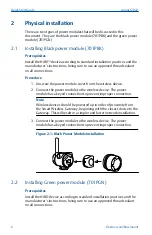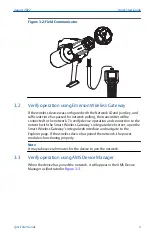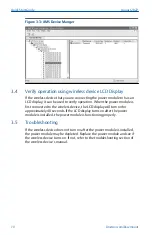
4
Disposal/recycling of depleted power modules
1. Dispose in accordance with applicable laws and regulations in your
country and state.
2. Disposal should only be performed by authorized professionals in
accordance with applicable requirements for hazardous waste
transportation and disposal.
3. Incineration should only be performed by trained professionals in
authorized facilities.
Shipping regulations
Primary lithium batteries are regulated in transportation by the U.S.
Department of Transportation, and are also covered by IATA (International
Air Transport Association), ICAO (International Civil Aviation Organization),
and ARD (European Ground Transportation of Dangerous Goods). It is the
responsibility of the shipper to ensure compliance with these or any other
local requirements. Please consult current regulations and requirements
before shipping.
Handling considerations
Each black power module contains two “C” size primary lithium batteries.
Each green power module contains one “D” size primary lithium battery.
Under normal conditions, the battery materials are self-contained and are
not reactive as long as the batteries and the battery pack integrity are
maintained. Care should be taken to prevent thermal, electrical, or
mechanical damage. Contacts should be protected to prevent premature
discharge.
Use caution when handling the power module. It may be damaged if
dropped onto a hard surface. Battery hazards remain when cells are
discharged.
Environmental considerations
As with any battery, local environmental rules and regulations should be
consulted for proper management of spent batteries. If no specific
requirements exist, recycling through a qualified recycler is encouraged.
Consult the materials safety data sheet for battery specific information.
August 2022
Quick Start Guide
Quick Start Guide
11






































